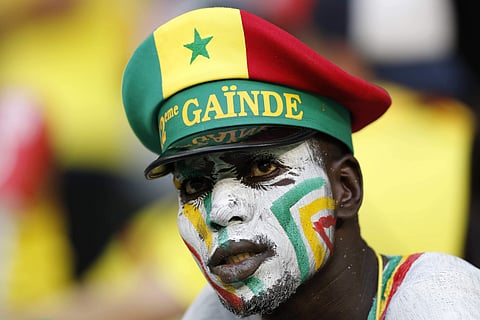

SARANSK: As the referee indicated they had run out of time in their efforts to find the goal that would have salvaged their World Cup campaign, Senegal’s players collapsed on the ground as if the world had ended. In the stands, coach Aliou Cisse stood motionless for a moment in disbelief. It must have been hard for him to believe that his team had blown it, especially after their electrifying start against Poland.
Senegal’s exit threw up a stat that painted a grim picture for Africa in general. This is the first time in 36 years that the World Cup’s knockout rounds do not have an African side.
Ever since Morocco, surprise package of 1986, topped a group that had England and Portugal, at least one African team managed to get out of the initial rounds. In 1990, it was the turn of Roger Milla’s Cameroon to make it all the way to the quarterfinals. Four years later, Nigeria managed to escape a group that had the Albiceleste again. The Nigerians did one better in 1998, out-qualifying Spain.
In 2002, Senegal shocked the world with an opening day rout of France. They ended up getting to the quarterfinals. The next two editions saw Ghana carrying the African flag. In 2006, they qualified from their group only to run into Brazil in the Round of 16. In 2010, they came within a scuffed penalty of qualifying for the semifinals.
The Brazil World Cup was another high point for Africa with two of their teams making it out of the group stages for the first time. Nigeria and Algeria qualified for the Round of 16, only to run into France and Germany, respectively. Against that backdrop, 2018’s failures seem like two steps back. Pele had famously predicted that an African nation would win the World Cup before the turn of the millennium. Eighteen years after that, they are still to make the semifinal.
The usual evils that plague their game have been visible in Russia as well — horrible defending and a lack of composure leading to late goals. Against Croatia, Nigeria lost out to an own goal and a 71st-minute penalty. Argentina’s winner against them came with four minutes left. Tunisia conceded injury-time goals against both England and Belgium.
As for Senegal, three of the four goals they conceded came in the last 20 minutes. After his side let in a 78th-minute equaliser against Japan, Cisse criticised his defenders and asked them to tighten up. In the next game against Colombia, the goal that knocked them out of the tournament came in the 74th minute — a very badly defended set-piece.
“The simple answer is that African teams are not prepared,” says Cameroonian journalist David Nzima who writes for Le Jour. “Every year a new coach arrives and it is a new change. We haven’t learnt lessons from previous Cups. Morocco failed in the last minutes. Nigeria conceded at the end. Senegal the same. We don’t have the leaders and managers who are capable. We don’t have the level. It is that simple.”
But Nzima believes there are more factors than just the teams’ mentality that place Africa at a disadvantage. “The means are there but they are badly used,” he says. “Our football associations and management are bad, they don’t think about football and performance. They just want miracles every time.
Then there is the fact that our competitions in Africa are not of a high standard.
“Also, African football now is based on European football. It is about mercenaries who head for Europe. The players want to play for the money,” he says. “African countries in Russia played European football and that doesn’t work. Senegal had seven from England, only the goalkeeper plays in Senegal.”
Cisse offered the counterpoint to that argument. “African football is making a lot of progress, and we are going to continue in this line. I am sure we will do good things in future. We are on the right track,” he said.
Africa's 'step back' in worst FIFA World Cup since 1982
Senegal 'magicians' hope to do Africa proud at FIFA World Cup
Senegal beat Poland 2-1 to become first African nation to win at FIFA World Cup 2018
African football needs more local coaches: Senegal coach Aliou Cisse
Cameroon great Roger Milla remembers FIFA World Cup magic as history beckons for Africa